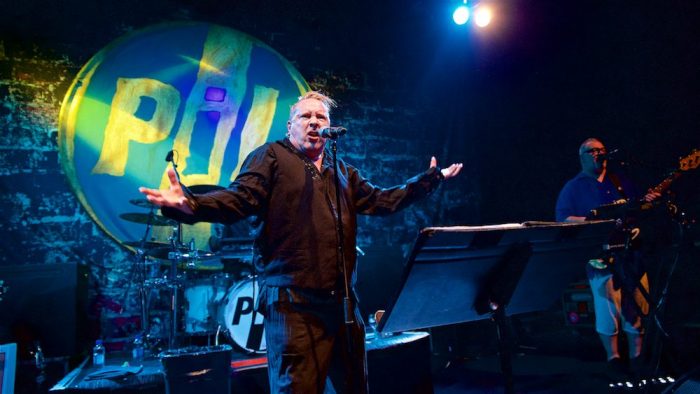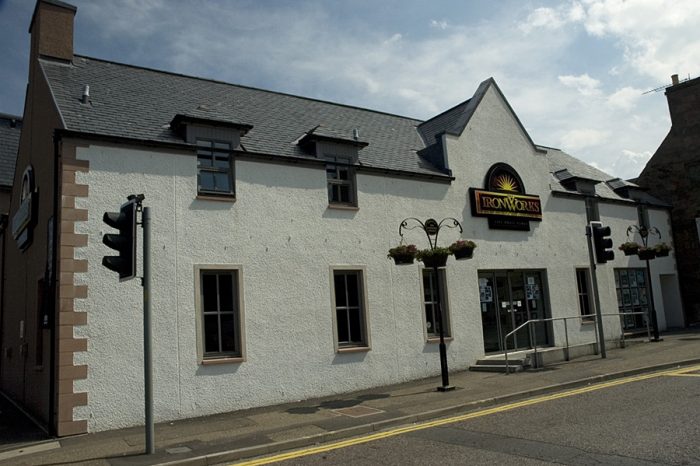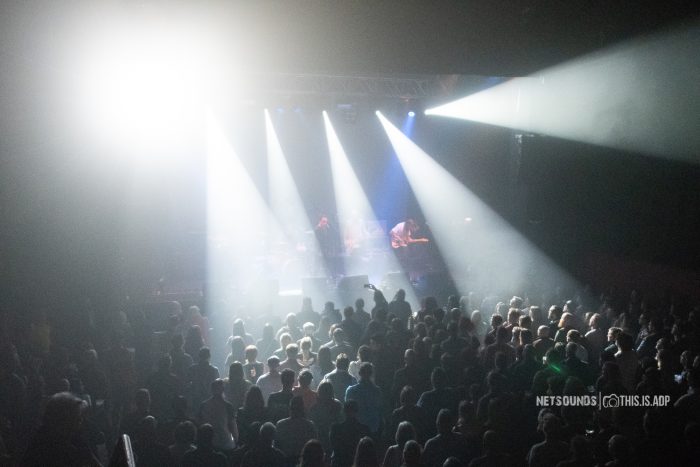Where did Johnny Rotten have one of his best gigs? Which venue was pivotal in Rachel Sermani’s career? Where did Gerry Cinnamon nearly take the roof down? What’s the best place to play in the Highlands?

Johnny Rotten (John Lydon PiL) loving the Ironworks in 2016. Photo courtesy Paul Campbell
In the Highlands, you read that right, and it prompts more questions. Which Inverness venue has a 1,000 capacity? Which resilient music business has proven innovative and pioneering for the past 11 years? And which venue is under threat of closure and demolition to make way for a hotel?
The answer to these questions is, of course, the Ironworks in Inverness. I have long been a fan of Ironworks. I’ve been to great gigs and parties there. Speaking at events, I’m impressed by the high quality technical infrastructure and the exemplary way the management team run the venue. Ironworks is a keystone venue in the Scottish live music touring circuit. And its director, Caroline Campbell, is a linchpin.
By keystone venue I mean one – in any locality or touring circuit – that holds the others up. Without the Ironworks, touring in Scotland doesn’t make sense for many artists. The venue is big enough to take large touring acts – forthcoming performances include Wet Wet Wet, Scouting For Girls, Idlewild, Niteworks, Skerryvore, Primal Scream, Tide Lines and Elephant Sessions – who wouldn’t otherwise have a place to play in Inverness.
Going the extra mile
Let’s take Scouting For Girls –a successful pop band from England with a widespread fanbase – as an example . Their November 2019 tour takes in Galashiels on the 6th, Ironworks on the 7th, The Loft in Forres on the 8th, The Sound Archive in Kirkwall on the 10th before heading to The Lemon Tree in Aberdeen then down to Oxford via Perth, Dunkeld and Stirling. There is no way that playing Forres and Dunkeld would be feasible without Ironworks in the mix. They might play Aberdeen, and possibly Kirkwall, but many of the other locations wouldn’t make sense. This is true for many touring artists.
By linchpin I mean someone who always goes the extra mile because it’s the way she is. For Caroline Campbell it’s simply the right thing to do. Linchpin behaviour in the context of Ironworks ensures that everyone has a great time. Audience, staff and local community enjoy the Ironworks positivity. Visiting artists enjoy a great show, are well looked after and take pride in signing the wall backstage. Not least Johnny Rotten (now John Lydon of Public Image Ltd). His 2016 thank you message to Ironworks is still on the mirror in the main dressing room:
Inverness ain’t no mess. True People!
All of this generates income. And jobs. Money spent locally, directly benefits the local economy. And the money flowing through the venue is just part of the multiple value of Ironworks. The economic value is significant and measurable. The venue can hold up to 1,000 people, or (through an innovative process introduced a couple of years ago) scaled down for more intimate events of 200–300 without compromising quality of the experience for artist or audience. It’s open several nights a week, every week, earning revenue from tickets, bar and merchandise The venue also hosts dinners, workshops and meet-ups generating additional income.

The Ironworks inspires affection and generates jobs
The Ironworks effect – a triple bottom line
Audiences and touring artists also spend money in local bars, restaurants, shops and hotels. And that’s just in Inverness. Take into account gigs in places that wouldn’t otherwise attract larger touring artists (such as The Loft in Forres) and then that venue is also generating income with audience and performers spending money on and off site. We can call that the “Ironworks effect”.
I’m involved in research into the value of music tourism in Glasgow and across Scotland. There is a robust and straightforward methodology we can apply to Ironworks to estimate the economic impact it has, not just in Inverness but in the surrounding area.
When calculating value, I think it’s vital to consider a triple bottom line: economy, society and culture. Each element is inextricably linked. Ironworks benefits Inverness socially because it employs people locally, and through some events (those talks, workshops, meet ups and so on) it also provides family-friendly social space. There could be other locations, but for many events Ironworks is just the right fit. Its reputation and status, make sense to do it there. And if none of these things happened, there would be discernible loss of income for the surrounding area.
Essential elements of local and national culture
Culture is the way we live in the world. A thriving music venue and nightclub is an essential element to student life. Inverness College, part of the University of the Highlands and Islands, has an impressive campus and offers courses to students from around the world. Students benefit the city financially and through the influx of new talent entering the jobs market. University places are highly competitive, though, and the local culture – especially the nightlife – is a major factor when deciding where to study.

The Idles at the Ironworks 2018, photo courtesy Al Donnelly/houdi
It’s not just about students. Ironworks is part of the local cultural ecology. It exists in a network of symbiotic establishments, providing an edgy complement to the wonderful Eden Court – a fantastic multi-disciplinary arts centre. While Eden Court is publicly funded, the Ironworks is an independent business. Ironworks benefits local bars and small venues (such as the Market Bar and Hootananny) by increasing footfall to the local area. But it also adds to the culture of the city centre. Everything that happens in and around Ironworks adds to the vibe of Inverness.
…what does this say about a wide cross-section of northern Scottish citizens coming together for a gig like this? People wanna party and people want change:
C.C. O’Hara Invernessgigs
In these ways, and many others, the Ironworks enriches all of our lives. Without it the main city in the Scottish Highlands would have so much less. And, in a small country, we would all be poorer for it.
Soul of the city
All in all, I find it hard to believe that even a large mid-market hotel would exceed – or even equal – the economic impact of Ironworks. I would like to see the due diligence that has informed any decision to replace Ironworks with a hotel, including a comparative study of triple bottom line benefits to Inverness and the surrounding area of Ironworks versus a new hotel.
Apparently other locations are being considered, for Ironworks. That could provide a glimmer of hope in the shadows of this story. But who would pay for it? And what is the economic sense of moving the venue to a new location? Why not use that location as the site for a new hotel?
When the O2 ABC in Glasgow was catastrophically damaged by fire in 2018, I said that losing a landmark hurts a city’s image, losing a business hurts its economy but losing a music venue hurts its soul. That is all true of Ironworks.
But I don’t want to pray for the Ironworks’ soul. I want to help find a way to keep this vitally important independent grassroots music venue going because the Ironworks is the lifeblood of the local music scene and an essential part of Highland culture.
PS: Plans to provide an alternative home are progressing. The next meeting is 8 November.
If you would you like to support the Ironworks contact SMIA where this article was first published
By Dougal Perman, executive director Scottish Music Industry Association (SMIA) and director of Inner Ear
Petition to save the Ironworks Do Not Replace the Ironworks with a Hotel
Further reading: Press and Journal, and STV
What’s next for O2ABC: SMIA
This is not a love song (‘but it’s f***king great to be here’) John Lydon of Public Image Ltd at the Ironworks 2016






Leave A Comment